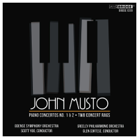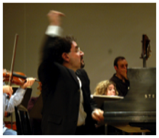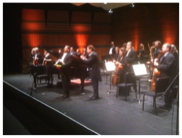
I freely admit that there are times when I feel like a latter-day Diogenes. Instead of trying to find an honest man (though that too would be a welcome discovery), my lamp is lifted in search of a recent piano concerto. I mean a real one, the kind written by a pianist rather than by somebody who merely gets around the keyboard, one who exploits the potential individual-versus- the-mob-drama inherent to the medium, and one who explores the infinite variety of colour combinations possible when a keyed-strung-percussion instrument is juxtaposed with a band of strings, winds and other percussionists. Certainly since Bartók almost finished his Third Concerto in 1945 and Prokofiev left his Sixth unfinished in 1952, there have been piano concertos aplenty. Think of Corigliano, Lutoslawski, Carter, Barber, Liebermann, Shostakovich,
Ginastera, Wuorinen, Rorem ... the list goes on, some achieving a toehold in the repertory, most not. But given the richness of this tradition, streching back all the way to the harpsichord concertos of Bach, you'd think fruit from this large, mature tree. More pieces that we want to listen to a fraction as often as we return again and again to concertos of Mozart, Beethoven, Chopin, Schumann, Liszt, Brahms, Rachmaninov or Bartók. Does the sheer number of successful, beloved piano concertos already written discourage composers from attempting new ones?
Listening to the two piano concertos of Brooklyn-born composer John Musto, I think I may have found something like what I’ve been looking for. These are bold, proud, unapologetically expressive concertos that, judging from Musto’s playing of their solo parts, were unquestionably written by a card- carrying pianist of significant gifts. They evidence full cognizance of the concerto tradition and seem not in the least cowed by it. Moreover, they speak a fluent vernacular – no elevated intellectual pretensions here – but a vernacular of a particularly eloquent stripe. Their vitality, it seems to me, stems in part from the fact that, like much
of the best American music, they never stray far from the spirit of the dance.

The First Concerto was composed between 1988 and 2005, begun at a time when, according to Musto, ‘the inexorable drumbeat of the HIV/AIDS epidemic was the accompaniment of so many lives. Among the fallen was the dedicatee of this piece, Joe Randel.’ The first movement, lasting almost 18 minutes of the piece’s half-hour duration, requires hand-in-glove ensemble between soloist and orchestra, here expertly provided by the Odense players under Scott Yoo. Musto describes the Andante grazioso as a ‘Mahlerian rag’, alluding to the great composer/conductor’s tenure in New York at the very time ragtime was taking root. To my ears it speaks with a Mozartean precision and economy. The finale is as brilliant and rich with ideas as any concerto that comes to mind, achieving for all that a terse cohesion. It would not surprise me if this piece were not one day regarded, along with a few others like John Adams’s On the Transmigration of Souls, among the great musical threnodies of our time.
In many ways the brash, exuberant Second Concerto is the antithesis of its predecessor. It was completed in 2006 on commission from George Steel, director of Columbia University’s Miller Theater, and is dedicated to Susan and Elihu Rose. Originally conceived for large chamber ensemble (18 players, including three percussionists playing 21 instruments), with expansion of the strings to full sections, it becomes a fully fledged orchestral work as heard here. Textures are sparkling and the orchestration as brilliant as the immensely challenging solo part. The kinetic thrust of the outer movements is irresistible: great gusts, whirls and eddies of sound whip up and intoxicatingly envelop before subsiding into the rich musical fabric. To an even greater degree than the First Concerto, the profusion of diverse ideas is striking. More remarkable is their coherence within an extraordinarily taut overall musical argument. The Greeley Philharmonic and Glen Cortese acquit themselves in fine style.

Two wistful, sultry rags, round out the programme of this beautifully produced recording. Representative of the ragtime renaissance that included William Bolcom and William Albright, they offer the opportunity to hear Musto’s cultivated piano playing up close and personal.
Musto has composed four operas, a good deal of chamber music and many, many songs and songs cycles. Recently I mentioned reviewing this disc to a veteran musician friend. As it turned out, he played in the orchestra for the 2004 premiere of Musto’s opera Volpone at Wolf Trap, the site for summer music and opera near Washington. His immediate response was, ‘Volpone was the hottest recent opera I’ve done. Charming, funny, challenging, it gave me hope for new opera!’ Personally speaking, Musto here gives me as much hope as anyone has for the future of the piano concerto.
